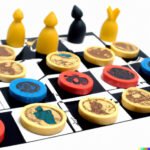Classic board games such as Monopoly, Clue, and Sorry have been a part of popular culture for decades, captivating players with their timeless gameplay and enduring appeal. These games have become iconic symbols of family fun and friendly competition. However, Hasbro has decided to put a comedic twist on these beloved classics with the launch of their new parody line.
In this blog post, we will delve into the history and cultural impact of classic board games, as well as Hasbro’s innovative decision to create a parody line. We will also provide detailed descriptions of the creative and humorous changes made to each game in the line, along with an exploration of Hasbro’s marketing strategies and the potential future developments in this area.
Join us as we embark on an exciting journey through the world of classic board games and discover how Hasbro is breathing new life into these time-honored favorites.
History of Classic Board Games
Classic board games have been a staple in many households for decades, providing hours of entertainment and friendly competition. Games like Monopoly, Clue, and Sorry have become iconic and are deeply ingrained in popular culture.
Monopoly, for example, has been a household name since its creation in the early 20th century and has seen numerous variations and adaptations over the years. These classic games have not only entertained generations but also played a significant role in shaping the board game industry as we know it today.
- Monopoly: Initially created to demonstrate the negative aspects of concentrating land in private monopolies, this game has evolved into a beloved pastime for families all around the world.
- Clue: Developed during World War II by Anthony E. Pratt, this murder mystery game quickly gained popularity and has since become a timeless classic known for its intriguing premise and engaging gameplay.
- Sorry: First introduced in the 1930s, Sorry has remained a popular choice for casual gamers due to its simple yet entertaining mechanics.
The enduring popularity of these classic board games has largely contributed to Hasbro’s decision to launch a parody line. The rich history and cultural impact of these games have made them perfect candidates for humorous reimagining. As such, it comes as no surprise that Hasbro opted to add a modern twist to these beloved classics with their new Parody Line of Classic Board Games.
Hasbro’s Parody Line
Hasbro, a well-known toy and board game company, has recently launched a new parody line of classic board games, adding a humorous twist to beloved favorites. The decision to create this parody line came from Hasbro’s desire to breathe new life into their classic board games and appeal to a wider audience.
The games included in this parody line include familiar titles such as Monopoly, Clue, and Sorry, all of which have been reimagined with unique features and changes that add a comedic element to the gameplay.
The decision-making process behind creating this parody line involved extensive market research and consumer feedback. Hasbro aimed to understand what modern audiences are looking for in board games and how they can bring fresh and entertaining content to the table. By infusing humor into traditional game formats, Hasbro has created a collection of board games that cater to both nostalgic players and those seeking something new and innovative.
Each game in the parody line includes clever twists that inject laughter into the playing experience. For example, in the Parody edition of Monopoly, players will encounter funny money denominations, hilarious chance cards, and comical property spaces that are sure to keep everyone entertained throughout the game. These unique features make the games stand out from their original versions while still retaining the essence of the classic gameplay that players know and love.
| Classic Game | Parody Game |
|---|---|
| Monopoly | Parody Edition Monopoly |
| Clue | Parody Edition Clue |
| Sorry | Parody Edition Sorry |
Game Descriptions
Monopoly, Clue, and Sorry are just a few examples of classic board games that have been beloved by families for generations. These games have stood the test of time and continue to be popular choices for game nights and gatherings. However, Hasbro has decided to take a creative spin on these timeless classics by launching a parody line of these iconic board games.
Hasbro’s parody line includes revamped versions of Monopoly, Clue, and Sorry, with each game featuring hilarious and creative changes to the original gameplay. For example, in the parody version of Monopoly, players might find themselves buying up properties on “Meme Street” instead of Park Place or Boardwalk.
Similarly, the parody version of Clue may take place in a haunted mansion filled with zany characters and outrageous weapons. These unique twists on the classic board games are sure to bring a fresh and entertaining experience to players.
One notable feature of Hasbro’s parody line is the attention to detail put into each game’s design and components. From humorous spin-off names for traditional game pieces to comical illustrations on the game boards, every aspect of the parody line has been carefully crafted to evoke laughter and enjoyment from players.
The decision-making process behind these changes undoubtedly involved extensive brainstorming sessions and creative collaboration within Hasbro’s team. As a result, the new parody line promises to breathe new life into these beloved classics while paying homage to their nostalgic appeal.
| Classic Game | Parody Version |
|---|---|
| Monopoly | Meme Street Edition |
| Clue | Haunted Mansion Edition |
| Sorry | Funny Mishaps Edition |
Marketing and Promotion
Hasbro’s Parody Line of Classic Board Games has garnered a lot of attention and anticipation from fans of the original games. In order to capitalize on this excitement, Hasbro has put considerable effort into marketing and promoting their new parody line. Through social media campaigns, advertisements, and partnerships, Hasbro is making sure that their audience is well aware of these hilarious new additions to the classic board game lineup.
Social Media Campaigns
Hasbro has been actively utilizing various social media platforms to generate interest and create buzz around their parody line. With engaging content, such as behind-the-scenes looks at the creation process, sneak peeks of the updated game designs, and interactive polls and quizzes related to the new games, Hasbro is keeping their audience engaged and excited about the upcoming release.
Advertisements
In addition to their digital marketing efforts, Hasbro has also invested in traditional advertising methods to reach a wider audience. Television commercials, print ads in magazines and newspapers, as well as online banner ads have all been deployed to ensure that consumers are aware of the parody line and its unique take on beloved classics.
Partnerships
To further maximize exposure for their parody line, Hasbro has sought out strategic partnerships with popular influencers, content creators, and other brands. By collaborating with well-known personalities or companies that align with the target demographic for these games, Hasbro can extend its reach even further and tap into new audiences who might not be familiar with their products. These partnerships have helped create a sense of excitement and exclusivity around the launch of these revamped classic board games.
The comprehensive marketing strategy employed by Hasbro demonstrates their commitment to ensuring that their parody line of classic board games receives maximum visibility ahead of its release. By leveraging both traditional and digital promotional tactics along with strategic partnerships, they are poised to successfully introduce these reimagined versions of iconic games to an eager consumer base.
Cultural Impact
Hasbro’s new parody line of classic board games has the potential to have a significant cultural impact on both the board game industry and the broader entertainment landscape. This line represents a departure from the traditional versions of these beloved games, injecting humor and creativity into familiar gameplay experiences. The potential effects of Hasbro’s parody line are worth examining in terms of consumer interest, industry trends, and creative innovation.
The introduction of this parody line aligns with a larger trend in the gaming industry toward playful reimagining of classic properties. By incorporating humor and satire into well-known games like Monopoly, Clue, and Sorry, Hasbro is not only attracting existing fans with a refreshed experience but also reaching new audiences who may be drawn to the comedic spin on timeless gameplay. This approach could influence other companies to explore similar avenues for invigorating their own intellectual properties.
Additionally, the release of Hasbro’s parody line creates an opportunity for cross-media synergy, potentially impacting the broader entertainment landscape through collaborations with other forms of media. For example, partnerships with television shows or digital platforms could further engage audiences and increase exposure for these reimagined board games. Overall, the cultural impact of Hasbro’s parody line extends beyond the gaming world, offering potential ripple effects throughout various entertainment spheres.
- Potential increase in consumer engagement within the board game community
- Influence on future game development strategies across the industry
- Opportunities for cross-media collaborations and expansions
Conclusion
In conclusion, Hasbro’s launch of a parody line of classic board games has generated excitement and anticipation among board game enthusiasts and casual players alike. The decision to reimagine beloved games such as Monopoly, Clue, and Sorry with creative and humorous twists demonstrates Hasbro’s commitment to innovation while honoring the nostalgia and cultural impact of these timeless classics.
By introducing these tongue-in-cheek versions, Hasbro is not only tapping into the enduring popularity of these games but also appealing to a new generation of players who enjoy a lighthearted and comedic approach to gaming.
The potential future developments in this area are promising, as Hasbro’s parody line paves the way for other companies to rethink and revitalize their own classic board game offerings. This launch may also inspire independent game designers to create their own parodies or innovative adaptations of well-known games, further enriching the diverse landscape of tabletop gaming.
Additionally, the success of this parody line could lead to expanded editions or spin-offs based on different themes or genres, allowing for even more creativity and entertainment in the world of board games.
As we celebrate the arrival of Hasbro’s parody line, it invites us to reflect on our own experiences with classic board games. Whether it’s reminiscing about family game nights or discovering new favorites with friends, these timeless games hold a special place in our hearts.
We encourage readers to share their thoughts and stories about classic board games, as they continue to bring joy and connection across generations. And as we look forward to what lies ahead in the world of board gaming, Hasbro’s parody line serves as a reminder that even the most familiar traditions can be reimagined with laughter and playfulness.
Frequently Asked Questions
What Is the Board Game That Looks Like Trouble?
The board game that looks like Trouble is, in fact, called Trouble. It is a classic game that involves popping the dice in a bubble to move your pieces around the board.
Is Milton Bradley Company Still in Business?
Yes, the Milton Bradley Company is still in business today. It is actually now a subsidiary of Hasbro, Inc., which acquired the company in 1984. They continue to produce and distribute board games and other toys.
What Is the Most Popular Classic Board Game?
The most popular classic board game is often considered to be Monopoly. This iconic game has been entertaining families for decades with its mix of strategy, luck, and negotiation as players try to buy and develop properties while bankrupting their opponents.

I love playing all kinds of games – from classics like Monopoly to modern favourites like Ticket to Ride.
I created this blog as a way to share my love of board games with others, and provide information on the latest releases and news in the industry.





